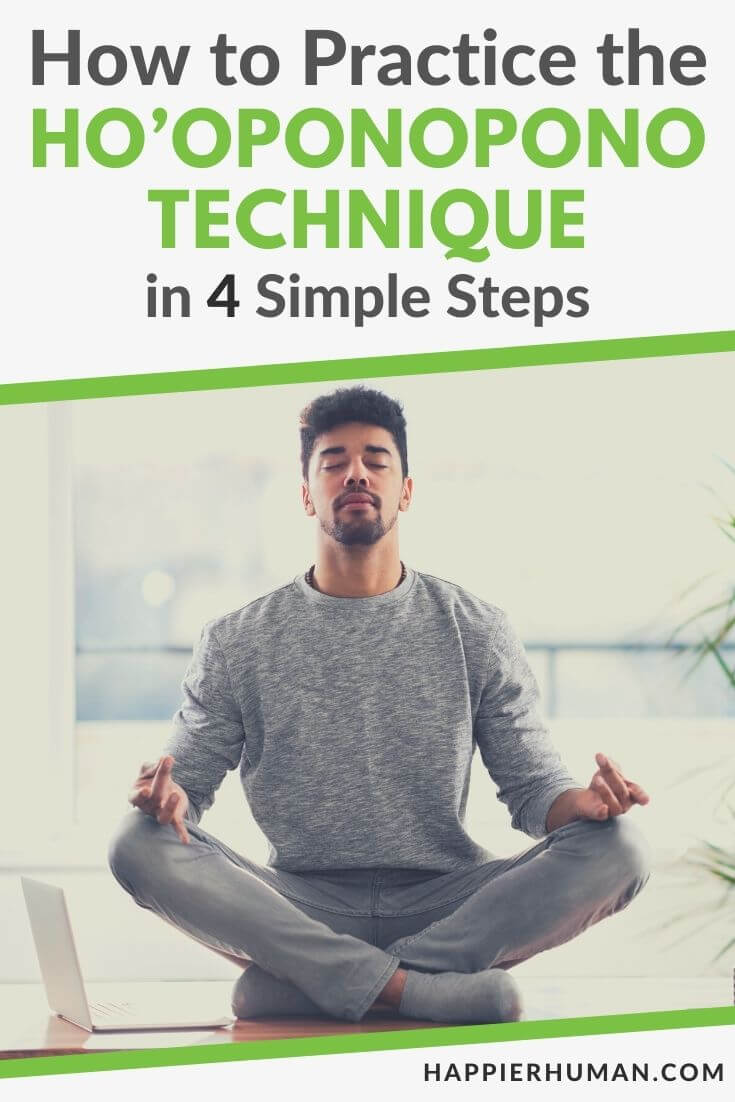Forgiveness is a big deal for those who believe in its power to provide spiritual freedom and healing. While not everyone subscribes to the principles of forgiveness or believes in it at all, Hawaiians swear by one version of forgiveness known as Ho’oponopono.
Ho’oponopono is a widely used family healing practice within the Hawaiian culture. The practice is based on the belief in divine intervention and involves techniques that are strategic and precise. Step by step, you can release the weight of personal grudges and emotional pain… allowing your mind, body, and spirit to heal in the process.
So if you're looking for a simple yet powerful way to practice forgiveness, then you may find the Ho’oponopono technique a perfect choice. Get ready to discover the incredible releasing powers of these four sentiments or mantras: “I'm sorry.” “Please forgive me.” “Thank you.” “I love you.”
What Is the Ho'oponopono Technique?
Can you say, “Ho'oponopono?” Don't worry. You'll get it after a few tries or you can simply say ho'op for short. Ho'oponopono (pronounced HO-oh-Po-no-Po-no) refers to an indigenous Hawaiian prayer for healing through forgiveness. The word literally means “to make right” with self and others.
Ho‘o means “to make” and pono means “right”. The second “pono” indicates the need to make things right both with one's self and others. Another interpretation of the words is “to cause things to move back into balance.” Those who say the prayer believe it creates a clean slate, makes way for reconciliation, and restores inner peace.
The Origin of the Ho'oponopono Technique
Hawaiian clinical psychologist, Dr. Ihaleakala Hew Len, is said to have discovered how asking forgiveness using certain words has healing powers for yourself and others. In the early 1980s, Len believed he cured a ward of mentally ill patients whom he never met.
According to his report, he healed them by healing himself through the process of forgiveness. All he did was go through each patient's file and imagine their mindset, which he believed allowed him to connect to the patient on a subconscious level. Next, Len asked for forgiveness.

As he became healed, the patient was also simultaneously healed. The results were thought to be a miracle. Dr. Len later created an improved version of the practice called Self I-Dentity Through Ho’oponopono (SITH).
Based on Dr. Len's experience, Ho'oponopono is practiced on the notion that our reality is a direct result of how we perceive things. Moreover, our perception is our responsibility. Therefore, chanting the four sentiments of forgiveness can give us full control over our lives, including the ability to heal ourselves. We can also heal others through ourselves without physical contact or them even knowing that we connected to their subconscious and intervened on their behalf.
Why Is Practicing Forgiveness Important?
Forgiving is important because it reduces or eliminates motivations for revenge and avoidance. You feel a sense of relief from no longer allowing that “thing” to affect you emotionally or psychologically.
Be that as it may, not everyone chooses to forgive–for personal reasons, such as not wanting to appear weak. Some believe pardoning others is accepting the wrong committed against them. Others refuse to forgive as a reminder of what occurred or as a way of protecting themselves against similar wrongs in the future.
I'll confess. I struggle with forgiveness, although I am much better now. Prayers to uplift the spirit, mindfulness, looking at things differently, and (more recently) Ho'oponopono have helped me to let go. I quickly learned that harboring resentment and an unwillingness to forgive affects me more than anyone else.
Think of how you felt being mad at someone for a very long time (long-held bitterness). I, for one, can tell you that I felt stressed, anxious, and worried. Every time I thought about what they'd done, I grew angrier, and my heartbeat raced.
Sometimes I want to let bygones be bygones. Other times, I want revenge. Have you ever felt that way? Well, it's a part of human nature, but it doesn't have to stay that way.
Can Unforgiveness Affect Your Health?
Yes. Holding animosity towards others for months or years can eventually take a toll on your physical and mental health. Meanwhile, they're unbothered or don't even know you're bearing malice.
Studies have found a connection between physical and mental ailments and holding grudges, anger, and hostility. Medical complaints include stress, tension, pain, high blood pressure, increased cholesterol levels, and insomnia. That's according to an article published by John Hopkins Medicine, “Forgiveness: Your Health Depends on It.”
This can happen since long-term anger keeps your body in a fight-or-flight mode (stress mode). Increased blood pressure and heart rate changes may result. The risk of heart disease also increases, according to one study.
On the other hand, research suggests the act of forgiving may reduce symptoms of anxiety, depression, and major psychiatric disorders. When you let things go, there's an overpowering sense of relief, which can calm stress levels almost immediately.
Another study published in the journal, Annals of Behavioral Medicine, found that, as a coping strategy, forgiveness can effectively reduce your perception of stress. Additionally, the participants of the study showed lowered psychological distress.
What are the Benefits of the Ho'oponopono Technique?
You don't have to be a Christian or subscribe to other religions to practice forgiveness. Think of it as a ritual you can use to purge ill thoughts and feelings, as well as protect your well-being.
Ho'oponopono offers a quick, simple, easy way to regain the power we lose by allowing unpleasant memories and feelings to fester. With it, you get full control of the process. You don't need anyone involved to initiate forgiveness and they certainly don't need to be present.

This is purely between you and the universe. Yes! You're seeking forgiveness from the universe… and you can do that anywhere, anytime, aloud, or silently. What's more, it is believed that saying, “I'm sorry,” “Please forgive me,” “Thank you,” and “I love you,” in that order can provide the following benefits:
Preparing to Practice the Ho'oponopono Technique
Below, you'll find a list detailing how to put your mind and body in alignment before you begin chanting the words for healing through forgiveness.
How to Practice Ho’oponopono in Four Simple Steps
“Cleanse” yourself of toxic feelings, increase self-love, and restore balance by chanting the following mantra repeatedly. You may sit with your eyes closed similar to how people meditate. Take a few deep breaths, and then slowly repeat these sentiments about 8 to 10 times. “I’m sorry.” Please forgive me.” Thank you.” I love you.” It's important to keep your mind focused on what you're seeking to clear out of your consciousness.
1. Acceptance — Say “I'm sorry”
Taking full responsibility for what's in your reality is one of the core principles of Ho'oponopono. Acceptance, also called repentance, is the first step to clearing the air for forgiveness to take place. To express it, say, “I'm sorry” [for whatever words, actions, thoughts, deeds, emotions, etc.]
This step essentially removes the tendency to defend, deflect, or blame things on others. You're required to accept that you contributed to whatever it is that's affecting your conscience. It doesn't matter who else is involved or whether they initiated the conflict.
Sometimes, the conflict or the thing that needs to be forgiven is with our selves. Other times, it concerns negative thoughts let into our consciousness and are interfering with purity. It seems unfair, but accepting responsibility works to remove the blockage.
As spiritual healer and Founder of the K Junction, Kuhoo Gupta, eloquently puts it, “Since Ho'oponopono believes that it is our internal conundrum that is resulting in unpleasant situations out-side, the first step to healing is admitting to the fact that there is something wrong dwelling inside you.”
2. Forgiveness — Say “Please forgive me”
Now that you have accepted responsibility for the misgivings, it is time to release the burden by asking the universe to forgive you for the wrong you apologized for. Note that you may feel a bit of apprehension or doubt about asking to be released from something you weren't physically a party to.
Remember that things at the center of the apology can relate to transgressions committed in your mind.
After saying, “Please forgive me,” you may feel unpleasant thoughts and emotions slowly waning away. Consider yourself cleansed and reborn. There's an instant sense of confidence that things are back in balance and you can, now, move on with your life!
3. Gratitude — Say “Thank you“
The next step to healing is expressing gratitude after believing the universe has accepted your apology and pardoned your misdeeds, real or perceived. You're also saying thank you for healing, not only for yourself but for those connected to you.

Your thank you should include an appreciation for the freedom of the mind, body, and soul, positive energy, restoration, and rebalance. Although you cannot see it, you're truly thankful for the changes and healthy vibrations already stirring within.
4. Express love — Say “I love you”
The final pillar of the practice is pausing to express love. Love is a natural and powerful healing potion. It brings people together, releases toxic emotions, and restores hope.
Say, “I love you” to send vibrations of love into the universe for yourself, your circumstances, missteps, weaknesses, and your experiences, both positive and negative.
As you say, “I love you,” hold the vision of the person or situation you've just sought forgiveness for.
End your prayer with a few moments of silence to let everything resonate. Open your eyes. How do you feel? You are welcome to continue chanting until you feel overtaken by a sense of relief, peace, warmth, and love.
When to use Ho'oponopono
Feeling weighed down by past traumas involving parental neglect, abuse, or intimate partner violence? How about the burden of unforgiveness you're carrying from seeing a loved one get hurt?
Whether it's personal or linked to a loved one or a stranger, Ho'oponopono might provide the healing you seek on behalf of yourself and others.
Besides, anytime is the right time to use the spiritual cleansing prayer to purge yourself of anger, hurt, bitterness, or hatred. Start anew. Renew broken friendships and relationships and reconnect without any bad feelings, only with peace and love.
Ho'oponopono experts recommend practicing the ritual first thing in the morning and right before sleep. Carry out the healing cycle for at least 21 days. Scientists believe it takes three weeks to reprogram the subconscious when trying to form a new habit.
If you have time, watch the YouTube video where Hawaiian Elder, historian, and educator, Kumu Sabra Kauka, explains how to apply Ho’oponopono when forgiving someone.
Final Thoughts on Practicing the Ho'oponopono Technique
Ho’oponopono offers us an easy way to free ourselves from the prison of unforgiveness. One of the other beautiful aspects of this prayer is the fact that we can apply it to transform our lives.
We can literally create emotional space for a new and healthier reality. There's also a chance for us to enjoy improved health, well-being, and happiness.
In the words of Kumu Sabra Kauka, ‘…only by forgiving and moving on can you reach a higher point.” Be sure to explore 99 Daily Mantras for Happiness, Love, Positivity & Wellbeing.


